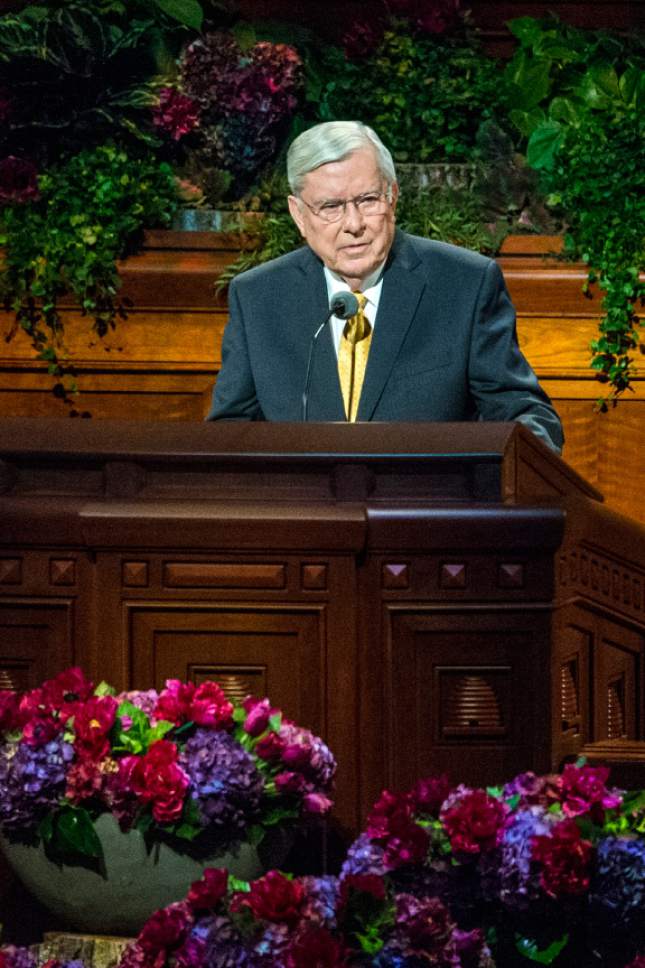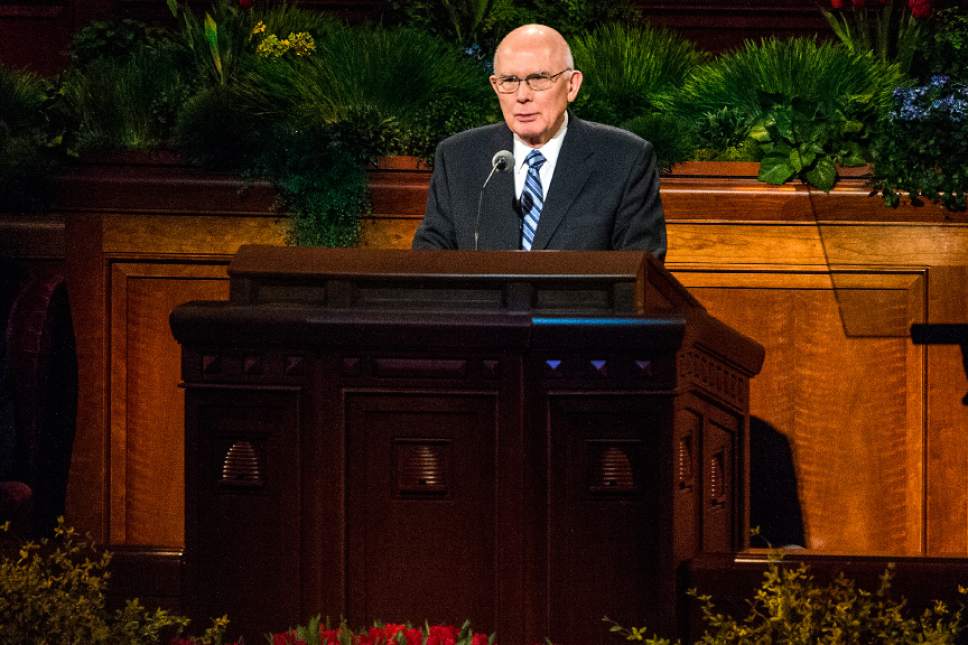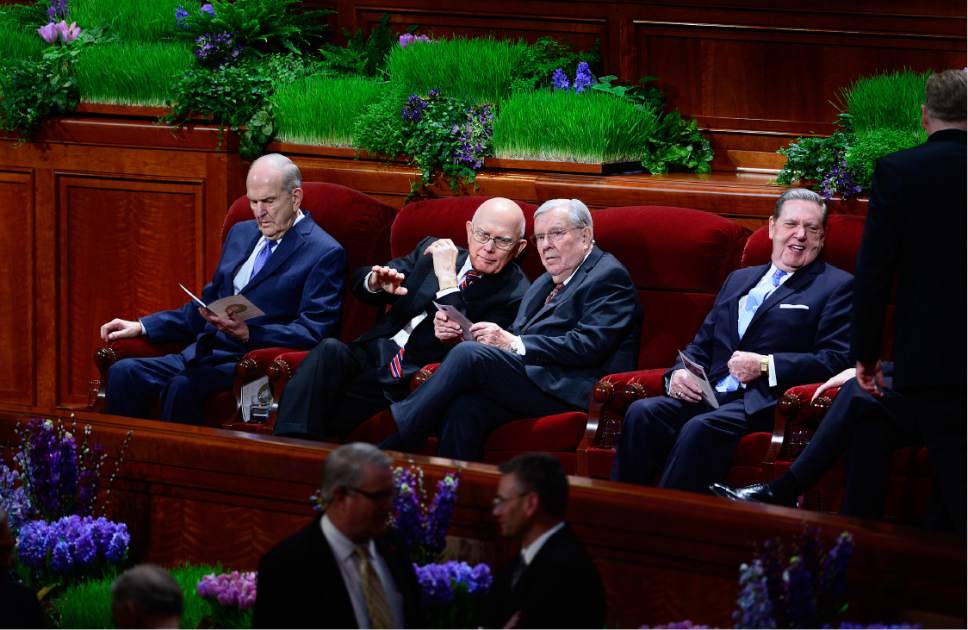This is an archived article that was published on sltrib.com in 2016, and information in the article may be outdated. It is provided only for personal research purposes and may not be reprinted.
Top LDS leaders have warned repeatedly about eroding religious liberties, but a new poll shows that Utah Mormons worry far more about traditional issues — the economy, education and terrorism.
A former Utah Supreme Court justice, LDS apostle Dallin H. Oaks has focused several semiannual sermons at Mormon General Conference, along with speeches at academic conferences, on the dangers of declining religious freedoms and the increasing restrictions on faith participation in the public square.
The safeguarding of conscience "helps people from a wide spectrum of beliefs feel assured that their deepest concerns and values are respected and protected," he told an audience in Argentina last year.
Other LDS apostles, including Jeffrey R. Holland, Quentin L. Cook, M. Russell Ballard and D. Todd Christofferson, have taken up the cause as well, defending Mormonism's beliefs and practices, particularly regarding homosexual behavior and same-sex unions among its members. The Utah-based Church of Jesus Christ of Latter-day Saints has even set up a website devoted to religious freedom.
But that topic has hardly become the most pressing issue for today's Mormons.
In a recent Dan Jones & Associates statewide survey of likely voters conducted for The Salt Lake Tribune and the Hinckley Institute of Politics, respondents were asked: What is the single most important issue facing the United States today? And what is the single most important issue facing Utah today?
In both cases, active Latter-day Saints listed religious freedom far down the list of concerns, way behind the economy and terrorism nationally and, in the state, far beneath education and the economy.
Only 4 percent of these Mormons named religious freedom as the biggest issue facing the U.S. and Utah. Even fewer (2 percent to 3 percent) Utahns overall ranked it as the leading concern.
"This is evidence that Mormons don't think it's the single most important issue," said Brigham Young University political scientist Quin Monson, "but that doesn't mean they don't think it's important."
The "frequency and intensity" of LDS Church authorities talking about religious freedom "has increased over time," he said. "In my mind, it has taken the place of emphasis on 'traditional marriage' [between a man and a woman]."
Now that same-sex marriage is legal in all 50 states, he said, "that battle has shifted the terrain to the question of religious freedom."
Utah reduced some of those competing tensions with passage of landmark legislation protecting lesbian, gay, bisexual and transgender individuals from housing and employment discrimination while safeguarding religious freedoms.
A poll released Wednesday by the Pew Research Center explored how notions of religious liberty and traditional morality have been pitted against civil rights and nondiscrimination policies.
Respondents were asked:
• Should private businesses be required to provide health-care insurance that covers contraception to their employees?
• Should private businesses have to serve same-sex couples if they have a religious objection to homosexual behavior?
• Should private businesses accommodate transgender patrons?
The survey of 4,538 adults was administered online and by mail among a nationally representative sample between Aug. 16 and Sept. 12.
More than two-thirds (67 percent) believe even those who have religious objections to contraception should be required to provide it in health-insurance plans for their employees.
Respondents to the other two questions were more evenly divided.
"About half of U.S. adults [49 percent] say businesses that provide wedding services, such as catering or flowers, should be required to provide those services to same-sex couples as they would for any other couple," Pew reports. "But a nearly equal share [48 percent] say businesses should be able to refuse services to same-sex couples if the business owner has religious objections to homosexuality."
That number is far greater (76 percent) among those "who say homosexual behavior is morally wrong," the survey found.
On the question of transgender bathroom use, 51 percent believe transgender individuals should be allowed to use the public restrooms of the gender with which they currently identify, while 46 percent believe they should use the bathroom of their birth gender.
The Pew survey's margin of error was plus or minus 2.4 percentage points.
"One of the goals of the survey," Pew reported, "was to see how many Americans feel torn because they can understand where both sides are coming from on these issues."
The pollster's conclusion? Not many.
Twitter: @religiongal —
What Utahns say is the biggest issue
Facing the U.S.:
• Economy, 30 percent
• Terrorism, 17 percent
• Immigration, 6 percent
• Budget, 5 percent
• Health care, 4 percent
• Human rights, 3 percent
• Religion freedom, 2 percent
Facing Utah:
• Education, 27 percent
• Economy, 19 percent
• Public lands, 6 percent
• Immigration, 5 percent
• Health care, 4 percent
• Religious freedom, 3 percent
Source: Dan Jones & Associates poll for The Salt Lake Tribune and the Hinckley Institute of Politics, Sept. 12-19, margin of error plus or minus 3.4 percentage points







